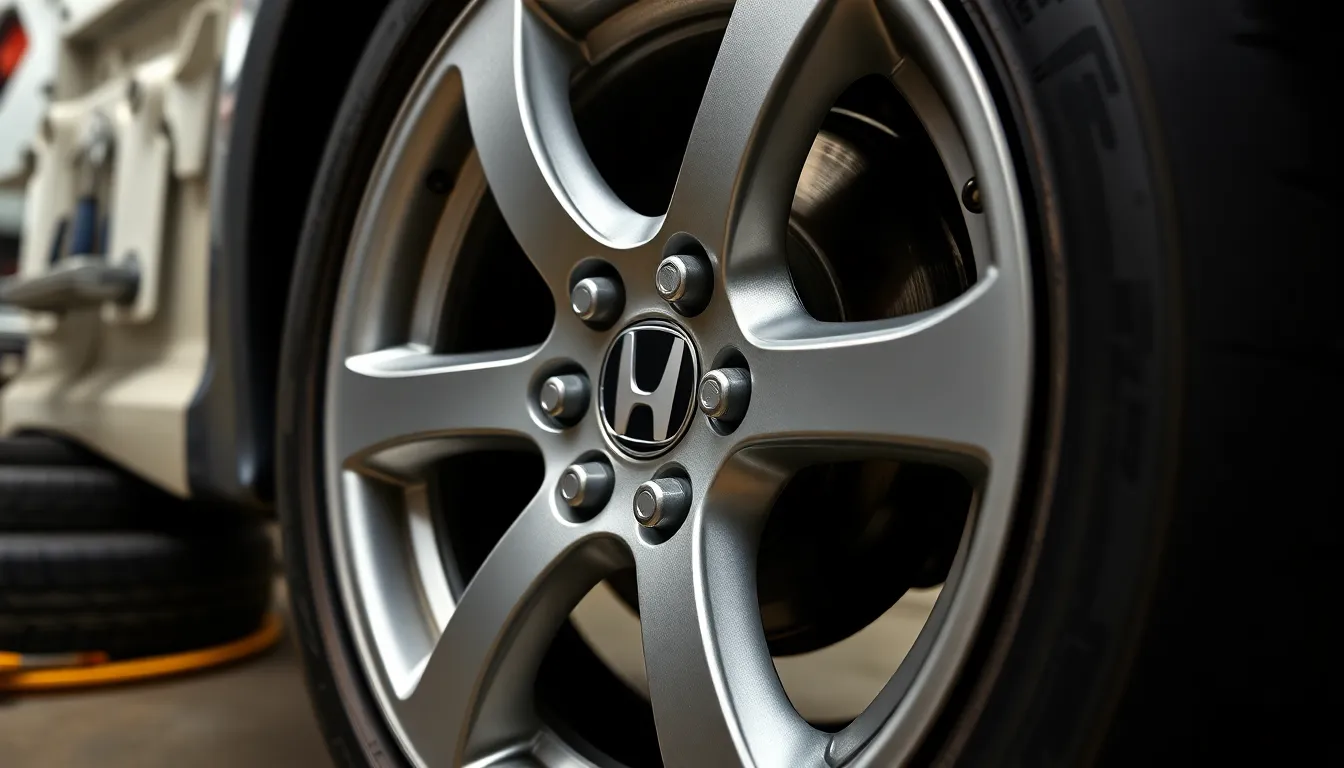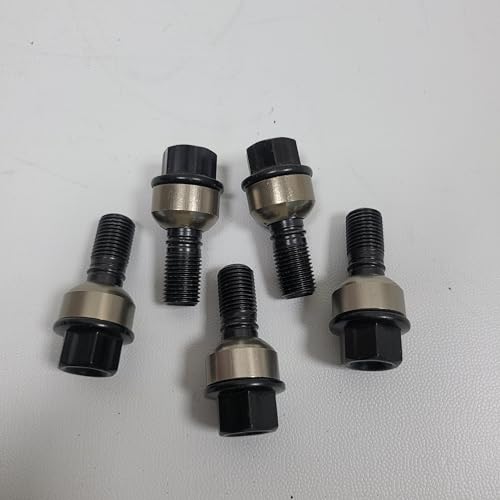When we’re upgrading wheels or replacing tires on our Honda Civic, understanding the bolt pattern becomes absolutely crucial. This exact measurement determines which wheels will properly fit our vehicle and ensures safe driving performance. Getting the wrong bolt pattern can lead to dangerous wheel separation or expensive returns.
The Honda Civic’s bolt pattern has remained remarkably consistent across most model years, making wheel shopping easier for owners. We’ll jump into the exact specifications that matter most when selecting aftermarket wheels or finding replacement options.
Whether we’re looking to enhance our Civic’s appearance with custom rims or simply need to replace a damaged wheel, knowing the correct bolt pattern saves time and prevents costly mistakes. We’ll break down everything from bolt circle diameter to proper torque specifications for optimal wheel installation.
Understanding Honda Civic Tire Bolt Patterns
Honda Civic tire bolt patterns determine how aftermarket wheels connect to your vehicle’s hub assembly. This measurement system ensures proper wheel fitment and maintains driving safety across all model years.
What Is a Bolt Pattern and Why It Matters
Bolt patterns represent the diameter of an imaginary circle formed by the center points of lug holes on your wheel hub. We measure this specification in millimeters for Honda Civics, with the most common pattern being 5×114.3mm (5 lugs spaced on a 114.3mm diameter circle).
The first number indicates the quantity of lug bolts, while the second number represents the pitch circle diameter (PCD). Incorrect bolt patterns create dangerous driving conditions including wheel wobble, premature tire wear, and potential wheel detachment during operation.
| Component | Honda Civic Specification |
|---|---|
| Lug Count | 5 bolts |
| Pitch Circle Diameter | 114.3mm |
| Thread Size | M12 x 1.5 |
| Torque Specification | 80 ft-lbs |
Proper bolt pattern matching prevents costly wheel returns and ensures optimal vehicle performance. Manufacturers design these specifications to distribute vehicle weight evenly across all mounting points, maintaining structural integrity during cornering and braking maneuvers.
How to Measure Your Honda Civic’s Bolt Pattern
Measuring your Honda Civic’s bolt pattern requires identifying the center-to-center distance between opposite lug holes. Start by removing one wheel to access the hub assembly for accurate measurements.
Count the total number of lug holes on your hub to confirm the first digit of your bolt pattern. Most Honda Civics feature 5-lug configurations, though some older models may vary.
Use a ruler or caliper to measure the distance from the center of one lug hole to the center of the hole directly opposite it. This measurement gives you the pitch circle diameter in millimeters for 5-lug wheels.
For wheels with an even number of lugs, measure straight across from center to center of opposite holes. Odd-numbered lug patterns require measuring from one lug hole center to the midpoint of the two opposite holes, then multiply by 1.701 to calculate the true PCD.
Verify your measurements match Honda’s 5×114.3mm specification before purchasing aftermarket wheels. Double-checking these dimensions prevents fitment issues and ensures your new wheels mount securely to your Civic’s hub assembly.
Honda Civic Bolt Pattern Specifications by Generation
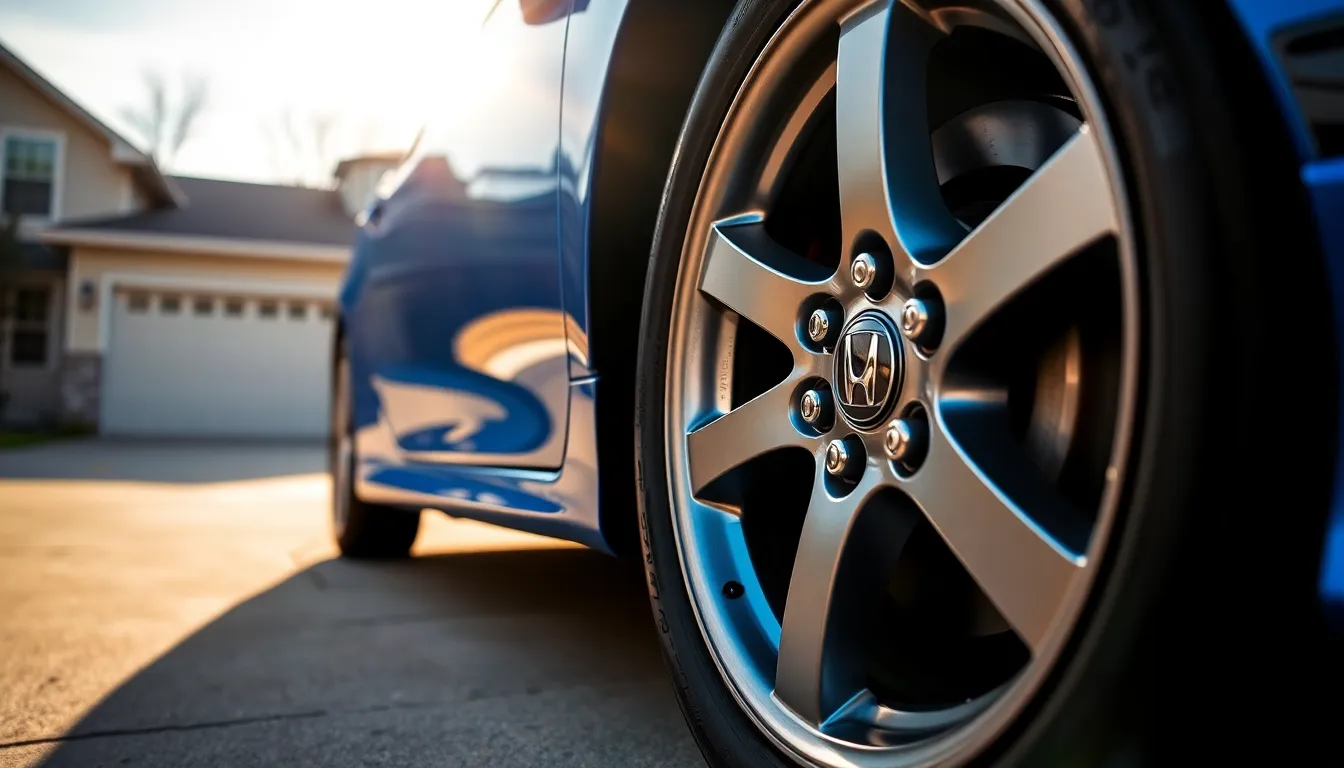
Honda Civic bolt pattern specifications have remained remarkably consistent across multiple generations, making wheel selection straightforward for owners. We’ve compiled comprehensive data for each generation to help you identify the exact specifications for your model year.
1996-2000 Honda Civic (6th Generation)
Sixth generation Honda Civics use a 4x100mm bolt pattern across all trim levels including DX, LX, EX and Si models. The hub bore measures 56.1mm diameter with M12 x 1.5 thread specifications for the lug nuts. Torque specification remains at 80 ft-lbs for proper wheel mounting on these models. Center bore diameter compatibility requires hubcentric rings when installing aftermarket wheels with larger bore sizes.
2001-2005 Honda Civic (7th Generation)
Seventh generation models introduced the 4x100mm bolt pattern that became standard for this era of Civic production. Lug nut specifications include M12 x 1.5 threading with 80 ft-lbs torque requirements for secure installation. Hub bore diameter measures 56.1mm across DX, LX, EX and Si variants during this generation. Wheel offset typically ranges from +40mm to +45mm for optimal fitment with factory suspension geometry.
2006-2011 Honda Civic (8th Generation)
Eighth generation Honda Civics transitioned to the 5×114.3mm bolt pattern that continues through current production models. This change accommodated larger brake components and improved wheel bearing design for enhanced performance. Hub bore diameter increased to 64.1mm to support the new five-lug configuration. Torque specification increased to 80 ft-lbs to match the additional lug nut for proper clamping force distribution.
2012-2015 Honda Civic (9th Generation)
Ninth generation models maintained the 5×114.3mm bolt pattern established in the previous generation for consistency across the model line. Hub bore diameter continues at 64.1mm with M12 x 1.5 thread specifications for all lug nuts. Torque requirements remain at 80 ft-lbs for proper wheel installation and safety compliance. Wheel offset specifications typically range from +45mm to +55mm depending on trim level and wheel size options.
2016-2021 Honda Civic (10th Generation)
Tenth generation Honda Civics retain the proven 5×114.3mm bolt pattern across sedan, coupe and hatchback body styles. Hub bore diameter measures 64.1mm with consistent M12 x 1.5 threading for lug nut compatibility. Performance variants including Si and Type R models use the same bolt pattern specifications as base trims. Torque specification remains at 80 ft-lbs for all wheel installations regardless of trim level or wheel size.
2022-Present Honda Civic (11th Generation)
Current generation models continue using the 5×114.3mm bolt pattern that provides excellent aftermarket wheel compatibility. Hub bore diameter maintains the 64.1mm specification with M12 x 1.5 thread requirements for lug nuts. Torque specification stays at 80 ft-lbs across all trim levels including the latest Si variant. Wheel offset recommendations range from +40mm to +50mm for optimal performance and appearance with factory suspension components.
Compatible Wheel Options for Honda Civic
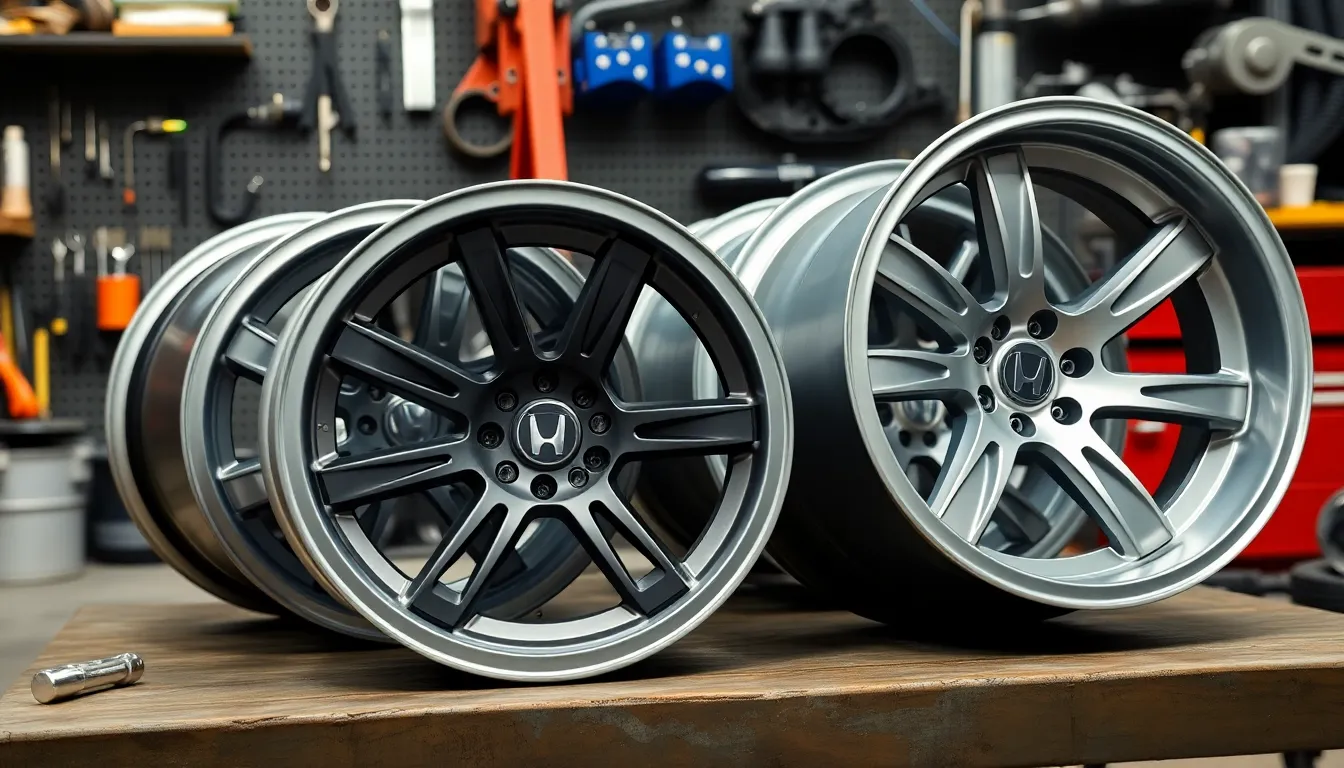
Compatible wheel options for Honda Civic models expand beyond factory-installed wheels to include many aftermarket alternatives that match the vehicle’s bolt pattern specifications. Understanding both OEM and aftermarket compatibility ensures proper fitment and maintains driving safety.
OEM Wheel Specifications
OEM wheel specifications for Honda Civic models vary by generation and trim level, providing different size and design options from the factory. The 6th and 7th generation Civics (1996-2005) came equipped with wheels ranging from 14 to 15 inches in diameter, utilizing the 4x100mm bolt pattern with a 56.1mm hub bore.
Eighth generation models (2006-2011) introduced larger wheel options spanning 15 to 17 inches, marking the transition to the 5×114.3mm bolt pattern that became Honda’s standard. These wheels feature a 64.1mm hub bore and accommodate M12 x 1.5 threaded lug nuts with 80 ft-lbs torque specifications.
Current generation Civics (9th through 11th generations) offer wheel sizes from 16 to 19 inches depending on trim level, with Sport and Type R variants receiving larger diameter options. All modern Civic wheels maintain the 5×114.3mm bolt pattern with consistent hub bore and threading specifications across trim levels.
| Generation | Years | Wheel Sizes | Bolt Pattern | Hub Bore |
|---|---|---|---|---|
| 6th-7th | 1996-2005 | 14″-15″ | 4x100mm | 56.1mm |
| 8th | 2006-2011 | 15″-17″ | 5×114.3mm | 64.1mm |
| 9th-11th | 2012-present | 16″-19″ | 5×114.3mm | 64.1mm |
Aftermarket Wheel Compatibility
Aftermarket wheel compatibility for Honda Civic models depends on matching the correct bolt pattern, hub bore diameter, and offset specifications to ensure proper fitment. Manufacturers like Enkei, BBS, and Konig produce wheels specifically designed for the 5×114.3mm bolt pattern used in modern Civics.
Popular aftermarket options include lightweight forged wheels that reduce unsprung weight and improve handling performance. Racing wheels from brands such as Volk Racing and Work Emotion offer sizes ranging from 17 to 19 inches with optimized offsets for track use.
Hub centric rings become necessary when aftermarket wheels feature larger hub bores than the Civic’s 64.1mm specification. These plastic or aluminum rings center the wheel properly on the hub and prevent vibration during driving.
Offset considerations range from +35mm to +45mm for most Honda Civic applications, with lower offsets providing a more aggressive stance while higher offsets maintain factory-like wheel positioning. Custom wheel packages often include performance tires sized appropriately for the chosen wheel diameter and width specifications.
Common Issues and Troubleshooting
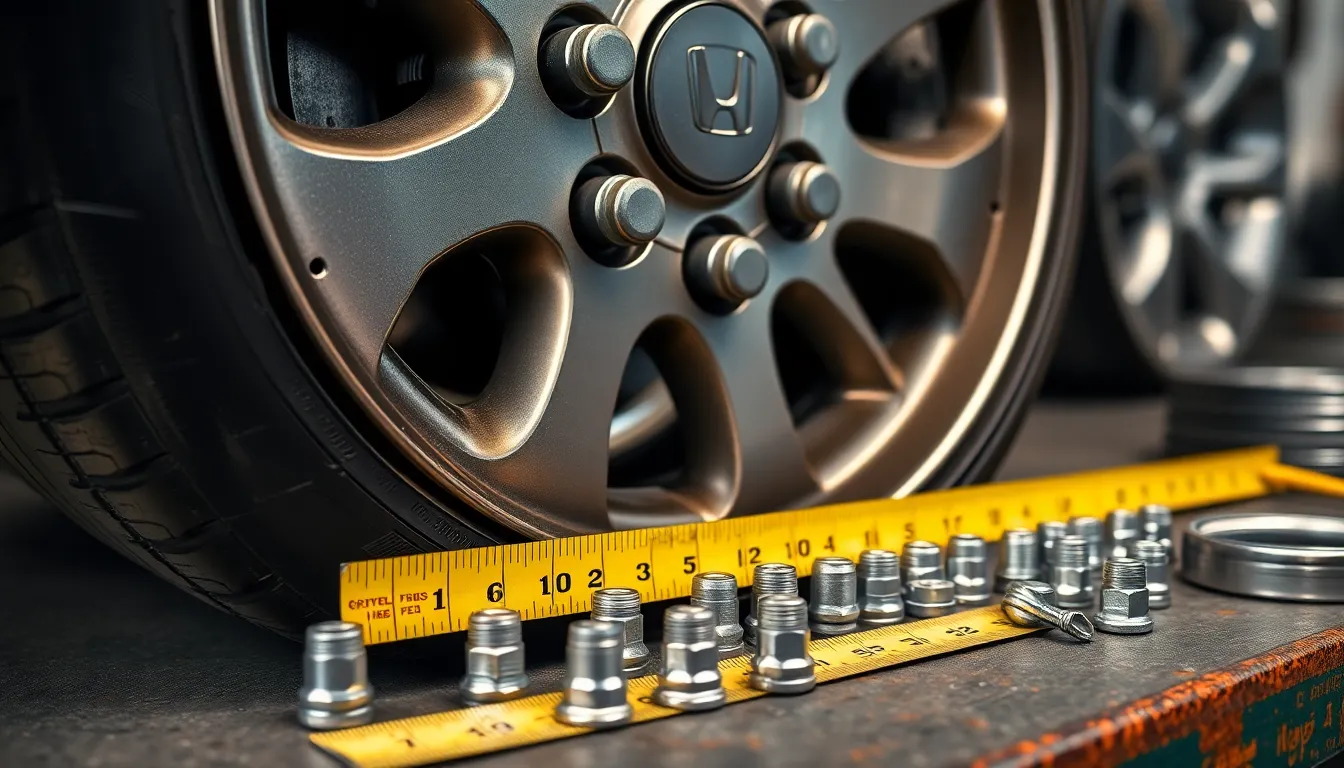
Honda Civic bolt pattern problems typically arise from incorrect measurements or compatibility misunderstandings during wheel replacement. We’ve identified the most frequent issues that Honda Civic owners encounter when selecting aftermarket wheels.
Mismatched Bolt Patterns
Mismatched bolt patterns create dangerous driving conditions that compromise vehicle safety and performance. We see this issue most commonly when owners attempt to install 4x100mm wheels on 8th generation or newer Honda Civics that require 5×114.3mm patterns.
Cross-generation compatibility errors occur when owners purchase wheels designed for older Honda Civic models without verifying their vehicle’s exact requirements. The transition from 4x100mm to 5×114.3mm between the 7th and 8th generations creates confusion among buyers who assume universal Honda Civic compatibility.
Universal bolt pattern assumptions lead to purchasing decisions based on incomplete information. Many aftermarket wheel retailers market products as “Honda Civic compatible” without specifying generation requirements or exact bolt pattern measurements.
Installation attempts with incorrect patterns result in several observable symptoms:
- Lug nuts fail to thread properly into wheel mounting holes
- Visible gaps appear between the wheel hub and mounting surface
- Wheel wobble occurs during test fitting before tightening
- Uneven contact points create stress concentration on individual bolts
Wheel Fitment Problems
Wheel fitment problems extend beyond bolt pattern matching to include hub bore diameter and offset specifications that affect vehicle performance. We encounter these issues when owners focus solely on bolt pattern compatibility while overlooking other critical dimensions.
Hub bore diameter mismatches create centering problems that cause vibration and premature tire wear. Honda Civic hub bore diameters measure 64.1mm across all generations, but aftermarket wheels often feature larger bore diameters that require hub centric rings for proper fitment.
Offset specification errors alter the vehicle’s handling characteristics and suspension geometry. We observe three common offset problems:
| Offset Issue | Measurement Range | Impact on Vehicle |
|---|---|---|
| Excessive positive offset | +45mm to +55mm | Wheels sit too deep, rubbing inner fender wells |
| Insufficient positive offset | +15mm to +25mm | Wheels extend beyond fender edges |
| Negative offset | -10mm to -25mm | Suspension components experience increased stress |
Load rating inadequacies compromise safety when aftermarket wheels can’t support the Honda Civic’s gross vehicle weight rating. OEM wheels typically feature load ratings between 1,200 and 1,500 pounds per wheel, depending on the generation and trim level.
Thread pitch incompatibilities prevent proper lug nut installation when aftermarket wheels feature different threading than Honda’s M12 x 1.5 specification. Some aftermarket wheels require M12 x 1.25 or M14 x 1.5 threading that doesn’t match Honda Civic hub assemblies.
Upgrading Your Honda Civic Wheels

Upgrading Honda Civic wheels transforms both performance capabilities and visual appeal while maintaining the critical 5×114.3mm bolt pattern compatibility. Modern Honda Civic owners can choose from extensive aftermarket options that enhance driving dynamics and personalize their vehicle’s appearance.
Performance Considerations
Performance wheel upgrades deliver measurable improvements in handling response and braking efficiency for Honda Civic models. Lightweight forged wheels reduce unsprung weight by 3-5 pounds per corner compared to stock cast aluminum wheels, improving acceleration and suspension responsiveness.
Racing wheel specifications include wider rim widths from 17×8 to 19×9.5 inches that accommodate performance tires with larger contact patches. Track-focused wheels feature aggressive offset ranges between +35mm to +45mm that optimize suspension geometry for cornering stability.
Brake clearance considerations become critical when selecting performance wheels for Honda Civic Si and Type R models. Big brake kit compatibility requires minimum spoke clearance of 18 inches for Brembo calipers and 17 inches for aftermarket sport brake systems.
Performance wheel materials include:
- Forged aluminum wheels weighing 15-18 pounds each for maximum strength
- Flow-formed construction offering 20% weight reduction over cast wheels
- Carbon fiber composite options providing ultimate weight savings at 12-14 pounds per wheel
Aesthetic Modifications
Aesthetic wheel upgrades transform Honda Civic appearance through size increases and distinctive spoke patterns while maintaining bolt pattern integrity. Wheel diameter upgrades from stock 16-inch to 18 or 19-inch options create dramatic visual impact and lower sidewall profiles.
Finish options include powder coating in custom colors, machined face treatments, and chrome or black chrome applications. Gloss black wheels provide aggressive styling for sport-oriented builds, while bronze and gunmetal finishes complement both sedan and hatchback body styles.
Stance modifications use exact offset ranges to achieve desired wheel positioning within fender wells. Aggressive fitment employs +25mm to +35mm offsets for flush wheel alignment, while conservative setups maintain +40mm to +45mm offsets for optimal clearance.
Popular aesthetic upgrade combinations include:
- 18×8.5 wheels with +35mm offset for balanced appearance
- 19×9 square setups creating uniform stance front and rear
- Staggered configurations using wider rear wheels for performance vehicles
- Multi-piece construction allowing custom barrel and face combinations
Tire sizing adjustments maintain overall diameter within 3% of stock specifications to preserve speedometer accuracy and prevent clearance issues with Honda Civic suspension components.
Conclusion
Understanding your Honda Civic’s bolt pattern specifications empowers you to make informed decisions about wheel upgrades and replacements. We’ve covered the essential measurements and compatibility requirements that keep your vehicle safe on the road.
Whether you’re pursuing performance enhancements or aesthetic modifications the 5×114.3mm bolt pattern found on newer Civic generations offers excellent aftermarket wheel selection. Remember that proper fitment goes beyond just bolt pattern matching.
Always verify hub bore diameter offset specifications and load ratings before making your final wheel selection. These details ensure optimal performance and prevent costly installation issues down the road.
With this knowledge you’re well-equipped to confidently choose wheels that enhance both your Civic’s appearance and driving experience while maintaining the safety standards Honda engineered into your vehicle.
Frequently Asked Questions
What is the bolt pattern for my Honda Civic?
The bolt pattern depends on your Civic’s generation. Models from 1996-2005 (6th and 7th generation) use a 4x100mm pattern, while 2006-present models (8th generation onward) use a 5×114.3mm pattern. This specification includes the number of bolts and the diameter of the circle they form. Always verify your specific model year before purchasing new wheels.
Can I use wheels from an older Honda Civic on my newer model?
No, you cannot interchange wheels between older and newer generations due to different bolt patterns. 1996-2005 Civics use 4x100mm, while 2006+ models use 5×114.3mm. Installing mismatched wheels creates dangerous driving conditions and potential wheel separation. Always match the exact bolt pattern specifications for your model year.
How do I measure my Honda Civic’s bolt pattern?
First, count the lug bolts (either 4 or 5). For 4-bolt patterns, measure straight across from center to center of opposite holes. For 5-bolt patterns, measure from the center of one hole to the far edge of the hole two positions away. This gives you the pitch circle diameter in millimeters.
What happens if I install wheels with the wrong bolt pattern?
Installing incorrect bolt patterns can cause wheel wobble, premature tire wear, and potentially dangerous wheel separation while driving. Mismatched patterns won’t properly secure to the hub assembly, creating unsafe conditions. Always verify bolt pattern compatibility before installation to ensure proper fitment and driving safety.
Are aftermarket wheels compatible with my Honda Civic?
Yes, aftermarket wheels are compatible if they match your Civic’s bolt pattern (4x100mm for 1996-2005 or 5×114.3mm for 2006+), hub bore diameter, and offset specifications. Popular brands manufacture wheels specifically for these patterns. Consider using hub centric rings for proper centering and verify load ratings meet your vehicle’s requirements.
What torque specification should I use for Honda Civic lug nuts?
Honda Civic lug nuts should be torqued to 80 ft-lbs for most model years. Use the proper M12 x 1.5 thread pitch specification. Always follow a star or crisscross pattern when tightening to ensure even pressure distribution. Proper torque prevents over-tightening damage and ensures secure wheel attachment.
Can I upgrade to larger wheels on my Honda Civic?
Yes, you can upgrade to larger wheels while maintaining the correct bolt pattern. Newer Civics support sizes from 16-19 inches with the 5×114.3mm pattern. When upgrading, maintain proper tire sizing to preserve speedometer accuracy and avoid clearance issues. Consider offset specifications to maintain proper handling characteristics.
What’s the difference between hub bore diameter and bolt pattern?
Bolt pattern determines how the wheel attaches to the hub (number of bolts and their circle diameter), while hub bore diameter is the center hole size that fits over the hub. Both must match for proper fitment. Incorrect hub bore can cause vibrations, while wrong bolt pattern prevents secure attachment altogether.

